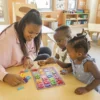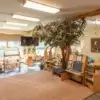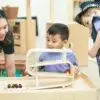Today’s students are pretty tech savvy. From iPhones to tablets, most children attending school today have grown up with technology as part of their everyday lives. These “digital natives” know how to use these devices to communicate too – from texting to blogging to engaging on any number of social media channels.
But the spoken word is still relevant in today’s society and possessing good oral communication skills is highly valued in the 21st century workforce. Not everyone is a natural born speaker, but everybody has a voice that needs to be heard. Starting in the classroom, teachers can encourage their students to find and refine their voice in a non-threatening environment. The following three strategies encourage practicing oral communication and promote student voice too.
Round Robin
Brainstorming is an interactive, and often fun, way to generate ideas or voice opinions on a topic. However, it is not uncommon for a select few students to dominate these types of discussions, leaving shy or introverted students to feel left out. The Round Robin strategy gives everyone an equal voice at the table. As implied in its name, this form of brainstorming often takes place with participants seated in a circle. One student will kick-off the discussion by answering a question or voicing an opinion or an idea on a particular subject. Afterward, each student has an opportunity to weigh in. Round Robins not only encourage whole class participation but are a great “gateway” exercise to promote critical thinking for younger students and get them comfortable with sharing their opinions and perspectives with others in a comfortable, relaxed environment.
Socratic Seminars
Socratic seminars take the idea of a classroom discussion and flip it on its head. Based on the Socratic method of student inquiry, Socratic seminars are student-led discussions that are often based on a text or group of texts and are linked in some way to a current event, hot topic, or real-world example. These are best conducted in a circle, though the formation can be modified to accommodate very large or small groups. Discussions start with an open-ended question and continue organically as students listen to each other’s comments and offer their own thoughts and perspectives, supported by textual evidence. Unlike other types of class discussion, Socratic seminars do require a bit of preparation upfront from both teachers and students – choosing a text or texts, preparing questions, establishing ground rules for speaking – yet the pay off is a rich exercise that teaches students how to listen to each other respectfully, think critically, and learn from peers with viewpoints that are different from their own.
Debate
Debating in the classroom is a great way to tie critical thinking skills (and in some cases collaboration skills) with communication. There is the public speaking aspect, yes, but leading up to the actual debate students must research their topic, identify data and evidence to back up their claims, and construct a compelling argument for or against an issue. Since debates often feature controversial topics, students learn to see issues from multiple angles and perspectives which can help them strengthen their stances for or against the issues in question. Aside from acquiring skills that will serve them well in the workplace, students can benefit in other ways as well. For example, standing up before one’s peers to deliver an argument can build a student’s confidence in public speaking and encourage them to give voice to their ideas and opinions more often and in different contexts.
As evidenced above, practicing communication skills in a 21st century classroom rarely happens with students sitting at their desks the entire time. Round Robins and Socratic seminars often take place in small or large groups and debates often require small group collaboration in preparation for the actual debate. Flexible classroom environments make it easier for students to transition the classroom for group work and move about among groups. Need inspiration? Natural Pod has worked with the following schools to reimagine their classrooms: Coquitlam School District, St Louis Catholic School, and Explorer Academy.











